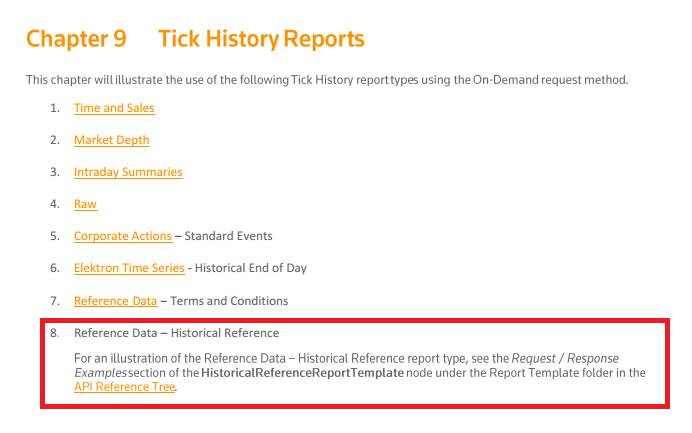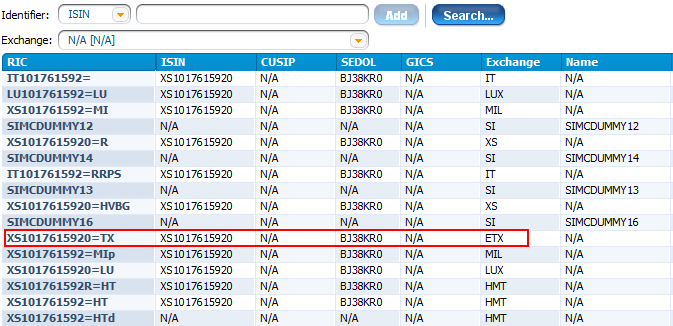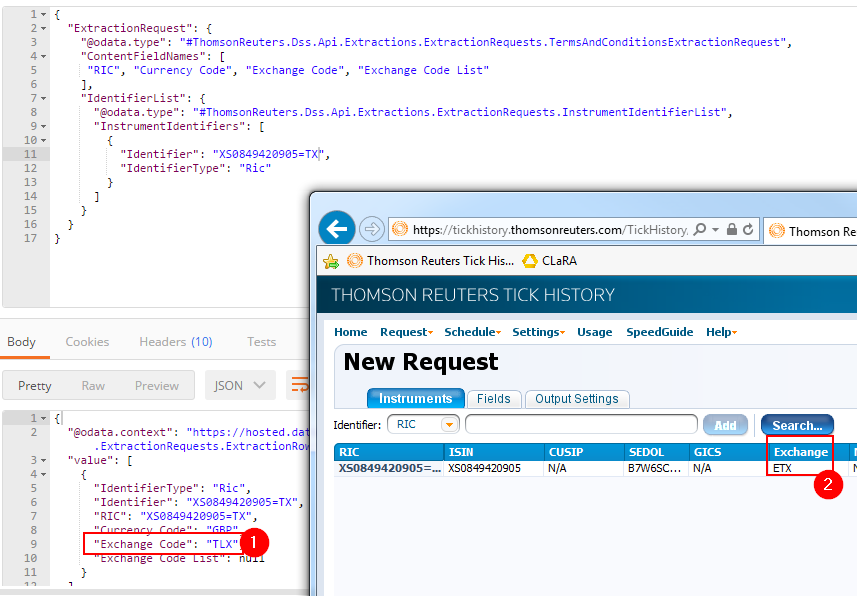Hi, we have found out that the exchange codes in TRTHv1 are not always matching the DSS field called 'source'. Is there an overview or mapping available we can use to migrate TRTHv1 exchange codes to DSS source fields? We really need this to migrate settings at our customers. Many thanks in advance!
- Home
- Anonymous
- Sign in
- Create
- Ask a question
- Spaces
- Alpha
- App Studio
- Block Chain
- Bot Platform
- Connected Risk APIs
- DSS
- Data Fusion
- Data Model Discovery
- Datastream
- Eikon COM
- Eikon Data APIs
- Electronic Trading
- Elektron
- FX Venues
- Intelligent Tagging
- Legal One
- Messenger Bot
- Messenger Side by Side
- ONESOURCE
- Open Calais
- Open PermID
- Org ID
- PAM
- ProView
- ProView Internal
- Product Insight
- Project Tracking
- RDMS
- Refinitiv Data Platform
- Refinitiv Due Diligence
- Rose's Space
- Screening
- Side by Side Integration API
- TR Knowledge Graph
- TREP APIs
- TREP Infrastructure
- TRKD
- TRTH
- Thomson One Smart
- Transactions
- Velocity Analytics
- Wealth Management Web Services
- Workspace SDK
- World-Check Data File
- Yield Book Analytics
- 中文论坛
- Explore
- Tags
- Questions
- Users
- Badges
For a deeper look into our DataScope Select REST API, look into:
Overview | Quickstart | Documentation | Downloads | Tutorials
question
Exchange codes (TRTHv1) / DSS source field

The client has raised the case: 05312711 for the issue about different exchange code between TRTH V1 and V2.
4 Answers
· Write an AnswerHi all
I have responded to Philipp with the below details -
I confirm “GetHistoricalExchanges” and “GetHistoricalCurrencies” are the right methods to obtain the numerical-alphabetical translations of exchange codes and currency codes.
The direct method of obtaining the exchange codes and currency codes is making a “Reference Data – Historical Reference” request (see highlighted below extracts from the API guide - http://paz.thomsonreuters.com/portalfiles/11047/ThomsonReutersTickHistory10.8RESTAPIUserGuidev1.1(2017121).pdf)

There’s a working example of a request for Historical Reference data included in the hyperlink in the highlighted area.
With respect Source Codes in DSS, the complete list is documented here - https://customers.reuters.com/a/productsupport/Datascope/GCODES/price_src_cds.html
And the list of exchange codes are documented here - https://customers.reuters.com/a/productsupport/Datascope/GCODES/dse_exch_cds.html
Source codes in DSS and the exchange codes are not necessarily the same. For certain exchanges, it is the RIC suffix that is used in DSS as source code. E.g. for NASDAQ, .OQ is the DSS source code whereas the exchange codes are NAS, NSM, NMS. For certain exchanges, e.g. National Stock Exchange of India (NSI), the source codes and the exchange codes are the same i.e. NSI. For non-exchange traded instruments you will have Source codes but no exchange codes. In short, there’s no established link between DSS source codes and TR Exchange codes.

Hi Philipp: would you be able to provide some examples highlighting differences in the TRTH v1 exchange codes vs DSS "source" field?

For example for RIC 'XS1017615920=TX'
The TRTHv1 exchange code is 'ETX'.
But in the DSS request the source is 'TLX'.
Since we are seraching for RICs using the exchange code this is causing some trouble with existing configurations. In the rollout we need to migrate TRTHv1 exchange codes to DSS source codes. Therefore a mapping between this two fields is what we really need.
Thanks in advance!
While I am looking into this I find "Exchange: ETX" in the DSS Historical search screen results for RIC XS1017615920=TX and so I am not exactly sure where you found "TLX".
Can you help me know what kind of DSS request you made that returned that to you? Was it a REST API call? If so, do you have the posted request data you can provide?

Here is one example of Search/GovCorpSearch
{"SearchRequest":{"AssetStatuses":["CLD","CAN","DFS","RDM","EXC","MAT","FNG","DEF","ISS","LIQ","NAC","PRE","PUT","RPN","REF","RMK","RBM","FDD","REP","RES","TEN","TBC","TBE","TBI","TBP","TBR","TBB","WHN"],"CurrencyCodes":["EUR"],"Group":{"Agency":true,"Government":true,"Corporate":true,"Supra":true},"Identifier":"XS1017615920","IdentifierType":"Isin","PreferredIdentifierType":"Ric"}}
I have also attached a screenshot of TRTHv1 showing the RIC we are interested in.

In TRTHv1 the exchange code is ETX and in the DSS response the source field is "TLX".
Sorry, the comment limit was reached.
What we need is a mapping of TRTH exchange codes to DSS source codes.
Thx in advance!
@Philipp
Hi Philipp
With respect Source Codes in DSS, the complete list is documented here - https://customers.reuters.com/a/productsupport/Datascope/GCODES/price_src_cds.html
And the list of exchange codes are documented here - https://customers.reuters.com/a/productsupport/Datascope/GCODES/dse_exch_cds.html
Source codes in DSS and the exchange codes are not necessarily the same. For certain exchanges, it is the RIC suffix that is used in DSS as source code. E.g. for NASDAQ, .OQ is the DSS source code whereas the exchange codes are NAS, NSM, NMS. For certain exchanges, e.g. National Stock Exchange of India (NSI), the source codes and the exchange codes are the same i.e. NSI. For non-exchange traded instruments you will have Source codes but no exchange codes. In short, there’s no established link between DSS source codes and TR Exchange codes.

Thanks a lot for that information. Still this causes some trouble on our side.
One last question regarding this topic. We now know that the source field is something different. But, what is the reason why in TRTH we sometimes see an exchange code assigned to a RIC and in DSS/TRTHv2 we just see a different one in the exchange code field?
Screenshot attached.

Write an Answer



